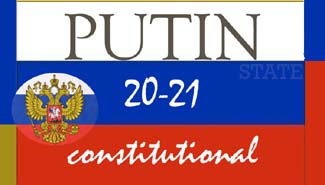
As Russia votes on Constitutional changes, Putin prepares for the next elections
July 1 marks a special day for many Russians as they will have a chance to hit the reset button for Vladimir Putin. A nation-wide referendum will decide whether to approve an array of constitutional amendments that will allow the Russian president who’s been in power for the last 20 years to run for two more terms in office, potentially extending his rule until 2036.
However, there is more at stake than just a resetting of Putin’s term limits.
Russian authorities seek to push through the whole package of constitutional reforms, under the pretext of “addressing” socio-demographic issues. The regime retains full control over the leading TV channels and other powerful media outlets, supporting among the population exaggerated patriotic sentiments and belief that all problems in Russia stem from policies of western powers, especially those of the United States, which allegedly seek to hinder Russia’s efforts to protect “legitimate national interests.”
Moreover, the amendments to the Russian Constitution, in part regarding granting immunity to the president, who has ceased to exercise his powers, suggest that Putin has doubts regarding public support if he self-nominates for another term, fearing possible persecution after he is off the helm. Russia experts argue that Putin’s system of “vertical power” makes him the final arbiter among elites and the new amendments to the Constitution will vest almost dictatorial powers to the president, including the right to dismiss judges of the supreme and constitutional courts.
Putin’s new 2020 edition of Russian Constitution resembles that adopted in Stalin’s era in 1936, involving pseudo-democracy and respect for citizen’s rights that remains on paper. In fact, the new life will see the revival of GULAGs, repression, and infringement of political freedoms. However, there’s hardly enough force among Russia’s opposition to stand up to the new challenges. The lack of any concerted public campaign against the constitutional changes is worrying, experts say, as it highlights a long-standing division in the ranks of Russia’s opposition and suggests that many are not ready to encourage street protests in the face of a potential clampdown by police.
By amending the Constitution, Putin remains determined to put to a halt any discussions about the “post-Putin era” that are potentially damaging to his authority. By trying to retain power, Putin dooms Russia and its citizens to long decades of stagnation and decline. After the constitutional reform, Putin in the new status will deal exclusively with foreign policy issues, rather than also being involved in addressing economic issues, thus absolving himself of responsibility for the low living standards of the population.
Putin’s popularity has taken a hit during the COVID-19 pandemic, but his approval ratings are still high. And the constitutional amendments include some provisions — for instance, the new amendments suggest that a marriage should be seen as a union solely between a man and a woman – a language that will appeal to a segment of conservative voters. At the same time, Putin has been trying to distance himself in the media space from any social issues, shifting the responsibility onto the government, while continuing to exploit international agenda to divert the attention of vast Russian audiences from internal problems.
Together with a “Putin Zeroing” project, the Kremlin is implementing a party project aiming to ensure safety of the United Russia party (in the event of a project failure), legitimize the self-proclaimed pseudo-republics on the territory of Ukraine promising their leaders’ a mandate in future Russian parliament.
The Putin administration is building political parties to split the opposition vote before the 2021 State Duma elections. In the beginning of 2020, a new organization, the Direct Democracy Party, announced the entry into the political arena of Russia. Its founder, Vyacheslav Makarov, is a video game developer and the product director for World of Tanks, an online role-playing game in the arcade tank simulator genre. His party lists involve such people as Maria Butina, a Russian spy who recently returned from the U.S. in a swap effort, and former defense minister of the so-called Donetsk People’s Republic, ex-FSB colonel Igor Strelkov (Girkin). Zakhar Prilepin, a well-known Russian novelist, also intends to enter parliament with his own political party on the foundations of the “For Truth” movement. They have already set up representative offices in partially recognized Abkhazia and South Ossetia, as well as in the self-proclaimed Donetsk and Luhansk People’s Republics. Kremlin officials are counting on the prospect that several new parties like For Truth and Direct Democracy that are loyal to the current regime will compete in the 2021 Duma elections thus creating an illusion of open competition. But critics mainly agree these odd new parties widely believed to be “curated” by the Kremlin’s spin doctors merely show Putin’s preparation for the next election is already in full swing.



